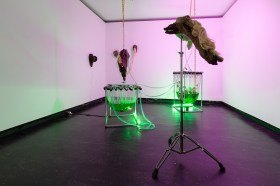Image: NIDA
A quality tertiary arts education will help you with much more than craft skills. We asked educators for their tips on building a career in the arts.
1. Build a profile
It’s essential early on in any budding arts career that a profile begins to be built to become well-known in the industry. Denise Roberts, CEO of Sydney-based acting school Screenwise said that the trends of the acting industry show a tendency to hire people who have an existing profile.
‘Producers even today realise that to get people to spend money in the theatre, you’ve got to have people in the case that people actually want to travel to go and see. It’s called show business for a reason, because it is a business. Having a profile really helps and profiles are developed through Film and Television,’ said Roberts.
2. Be multi-skilled
The more skills developed can increase the ability to be versatile and to adapt. Pete Ireland, Learning and Development Coordinator at Metro Screen said that it is important to begin with a variety of skills early on, to have the ability to wear different industry ‘hats’.
‘What ends up happening is you end up wearing more hats. Ultimately successful careers are about specialization but in your early career to have a great body of work, you have to be a producer or potentially a production designer. It’s whatever you need to do to get that ball rolling,’ said Ireland.
3. Perfect the portfolio
In order to move a career into action, it is crucial to be armed with an excellent portfolio to gain attention, exude professionalism and to showcase ability.
The International Screen Academy said that arts graduates need to know the importance of ‘creating a stand-out portfolio of work designed to impress industry recruiter’,’ said ISA.
4. Embrace your individuality
In a competitive industry, honing your own point of difference is essential. It is the one thing you have that others don’t. Jenevieve Chang, Senior Course Manager of NIDA’s Open Program, said being true to yourself is essential to projecting an effective image.
‘You have to have faith in what you have to offer. You have to be the best version of yourself. Don’t attempt at intimidating what you think someone wants because what you have to offer as an artist in all disciplines, as an actor, a writer, a designer or a director, you have to offer your unique vision of what it is to be human and the human experience,’ said Chang.
5. Do research
A wide understanding of the industry is vital, Dr. Lee McGowen, Head of Studies at Queensland University of Technology (QUT) said that it is important to learn as much as possible to become deeply immersed in each profession.
‘As well as academically and scholarly, there’s also a focus on development in the field that you want to study in. If you want to work in arts, events and festivals then we would be encouraging you to research that area, analysing clients in that area, making contact with people as well,’ said McGowen.
6. Master the basics
Beginning with a firm foundation grounded in artistic basics, Michael Snelling, Director and CEO of the National Art School said that learning the basics first helps a person move around artistically, recalling 2015 Venice Biennale’s artist Fiona Hall personal growth.
‘You need to get the kind of training that enables you to move freely around a range of things. At one point with Fiona Hall, who was a photographer for 15 years, and then she just rapidly moved into do sculptural and installation work. I asked her how did you do that so easily?‘ said Snelling, adding she said, ‘Because I did drawing. Drawing is not what I’m known for at all but drawing is how all my ideas take shape’.
7. Network, network, network
It’s all about who you know and a beginning arts career is all about making industry contacts. McGowen from QUT said that continuous networking throughout an arts career in a must-do.
‘People in the games industry for example will work from project to project,’ said McGowen. ‘We encourage people to be looking for people and be looking to build networks of contacts in the industry’.
The Australian Film Television & Radio School also emphasizes the important skill of networking early on in a arts career, to ‘network with industry and form life-long professional relationships’, said AFTRS.
8. Learn to be autonomous
An independently-motivated and autonomous person is a crucial career trait when starting out in the industry. Chang from NIDA Open said that their institutions philosophy is to create individuals that will self-reliant in the industry.
‘We teach people to become autonomous with their skills. So not only do we teach specific skill sets, we are teaching order for our students to be able to navigate through and make autonomous choices within training, but also in the industry,’ said Chang.
9. Never stop creating
While moving and shifting positions in the arts industry, it is important to not stop creating to insure continued self-made content. Ireland from Metro Screen said that having a job in the industry does not naturally feed into having a job as a content creator.
‘You could get a very successful job as a broadcaster and wonder why the visual story telling aspects of your career aren’t going anywhere and it’s because you’re not actually making any films,’ said Ireland. ‘If you stop writing, directing or being a project designer, when it comes to your own projects, having all the contacts in the world doesn’t help you if you don’t have a script’.
10. Be patient
The ultimate tip that needs to be remembered is that often a flourishing career in the arts is a long process where perseverance is key. Roberts from Screenwise said in the case of a starting out arts career, patience is a must-needed virtue.
‘If you’re thinking of becoming a professional actor in six weeks then you have another thing coming. You have to respect that and know that you have to pay your dues and you have to do the work, and that does not happen overnight,’ said Robert, adding arts industry beginners should be ‘prepared to be patient and they will persevere’.
This feature is part-one of our two-part education report by ArtsHub from Australia’s top tertiary educational institutions.
Participating tertiary institutions:
Australian Film Television & Radio School
National Art School
Metro Screen
National Institute of Dramatic Art
Screenwise
International Screen Academy
Queensland University of Technology





